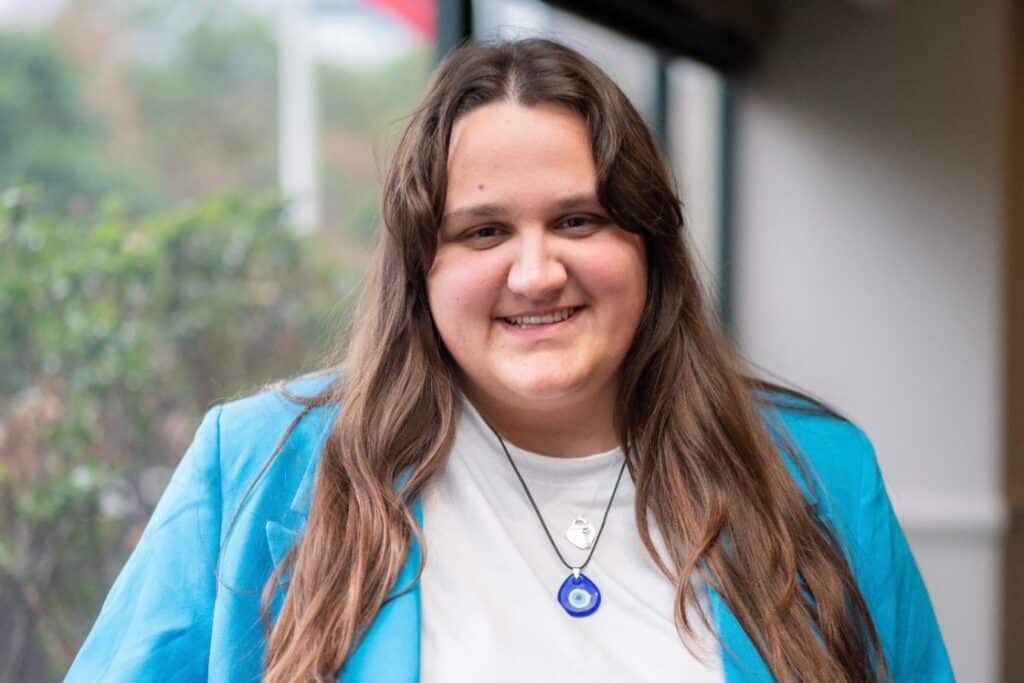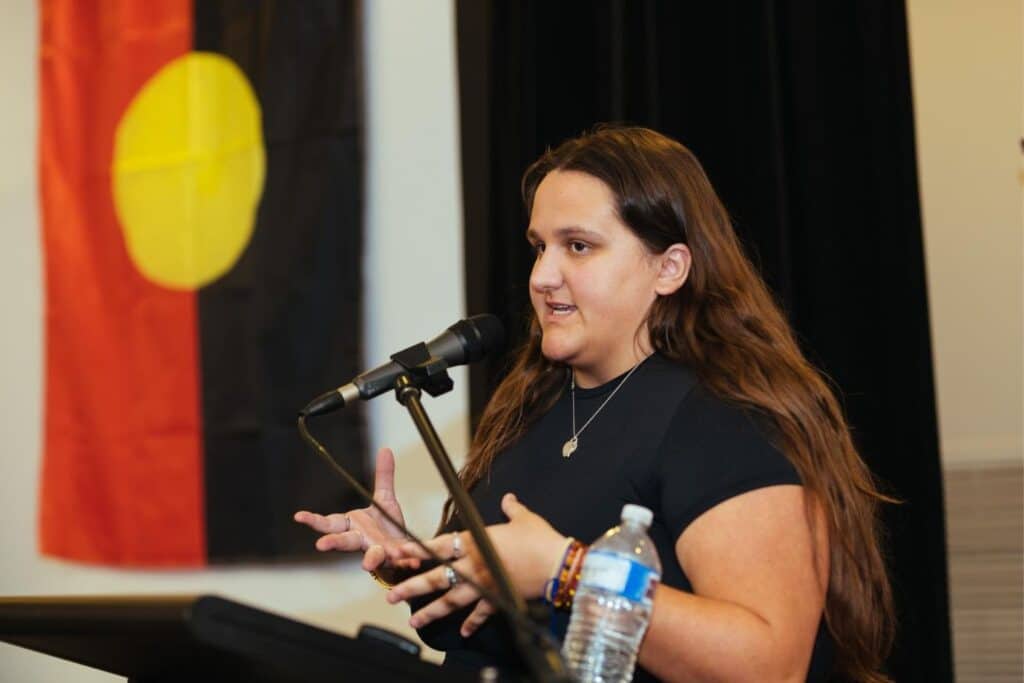Rallies calling for government action on violence against women are happening in a dozen locations across the country over the weekend.
The No More National Rally Against Violence, starting in Ballarat this Friday at 5pm, was organised in response to the targeted attacks on women in Bondi Junction on April 13, as well as the concerning growth of gender-based violence in Australia.
Just 17 weeks into the year, 25 women have been killed in 2024 at the hands of male-perpetrated violence, according to Destroy the Joint’s Counting Dead Women.
Over the weekend, a number of key people will be speaking at different rally locations around the country, including Chantel Otten in Melbourne, Hannah Ferguson in Sydney and Senator Larissa Waters in Brisbane.
Sarah Williams, founder of advocacy organisation What Were You Wearing, is the woman behind it all. She, along with several other organisations, have developed five key demands for action to come from the No More national rallies.

“We are four months into the year, and we’re already at such an appalling number of women killed and people lost to these crimes,” Williams told Women’s Agenda.
“Domestic, family and sexual violence rates are not decreasing, there’s so much more that needs to be done by our change makers and people in positions of power.”
(1) Declaration of national emergency
Several state and federal politicians have already called out the urgent need to recognise violence against women as a national emergency.
Last month, during Question Time, independent MPs Allegra Spender and Zoe Daniel issued a call to action on domestic violence in parliament, speaking about the national crisis and the need for men to step up.
More recently, Victorian Premier Jacinta Allan spoke out against the “unacceptable” number of women killed in Australia, saying it is the “number one law and order issue” in the country.
But Williams from What Were You Wearing said it’s time for Prime Minister Anthony Albanese to call violence against women what it is – a national emergency.
“I’m really wanting the government to make a statement, particularly Anthony Albanese, to say that this is a national emergency,” she said.
(2) Media regulation on publishing images of victims
Following Joel Cauchi’s targeted attack on women in Bondi on April 13, Australian media outlets were quick to publish images of the victims of the attack, including an image of 38-year-old mother Ashlee Good.
Her family issued a public statement the day after her death, saying they were “shocked” that some outlets published photos of Good “without our consent”.
“It has caused extreme distress amongst Ashlee’s loved ones and we request that the photos be taken down,” the family wrote.
Family of Ashlee Good, the mother slain in the Bondi attack yesterday, release statement a photo. Say baby currently doing “very well” and thank the men who cared her. pic.twitter.com/WKqBUtPFfm
— Mark Di Stefano (@MarkDiStef) April 14, 2024
The media’s behaviour following the attacks is not an isolated incident. Tabitha Acret is the mother of Mackenzie Anderson, who was brutally murdered in March 2022 allegedly by her former partner. Tragically, family and friends of Mackenzie found out about her death via Instagram and other media channels.
After her experience, as well as witnessing the same conduct in the wake of the Bondi attacks, Acret decided to create a petition. She is calling on policymakers to create legislation that stops media outlets from publishing images and other details about victims of domestic, family and sexual violence until at least 48 hours after their death.
Williams is hoping to “uplift and support” Acret’s efforts to change journalistic practices to better support victims of violence. Her petition is the second of five demands at the No More national rallies this weekend.
(3) #BelieveMe: Mandatory victim blaming prevention training
In 2021, Sarah Williams escaped a domestic violence relationship.
“Multiple times I could have been murdered,” she said. “I’m very lucky that I’m still here right now.”
Following her escape, very few people believed that she was a victim-survivor of domestic violence and sexual assault. In fact, she lost many of her family and friends because they simply didn’t believe her.
On top of that, Williams said she went through “some pretty horrific police misconduct” when she began the process of reporting her assault last year.
“I had detectives just asking me the most revolting questions and straight out saying that there’s no way it could’ve happened,” she said.
“(Police said) because we’d had sex before, then (sex) was still consensual.”
Her experience not only sparked the idea for her organisation, What Were You Wearing, but also the #BelieveMe campaign. The campaign is fighting for mandatory victim blaming prevention training for all frontline workers, and is the third demand of the No More national rallies.
The training, Williams said, would operate in a similar way to Responsible Service of Alcohol (RSA) training for hospitality staff in parts of Australia. Essentially, to become a police officer, paramedic, mental health pracitioner or any other frontline worker, one would have to obtain certification of completion of victim blaming prevention training.
The training would help frontline workers understand how questions, investigations and treatment can go on in a way that does not retraumatise the victim.
(4) Alternative reporting options; DFV specialist courts
As an Indigenous woman, Williams has come up against a number of barriers when dealing with the police.
“For us Indigenous folk, not a lot of us are comfortable going to police,” Williams said. “It puts a lot of barriers in place for us.”
Barriers also exist for the LGBTQIA+ community, people with disability and other intersecting identities, and this can stop a lot of sexual assaults from ever getting reported.
According to the Australian Bureau of Statistics’ 2021 Personal Safety Survey, 22 per cent of women and 6.1 per cent of men have experienced sexual violence since the age of 15. An overwhelming 92 per cent of women who experience sexual violence do not report the incident to police.
“I actually find it really surprising that it’s 2024 and the only place you can report an assault for it to become a criminal investigation is our police,” Williams said.
The fourth demand of the No More national rallies is providing victim-survivors with alternative reporting options, as well as establishing a specialist court that deals with domestic, family and sexual violence.
The first part of the demand – alternative reporting options – would look like a space for victim-survivors to go to that is away from a police station and away from officers in uniform, which can be quite triggering and intimidating for victim-survivors.
The second part, the specialist courts, would involve having trauma-informed judges and lawyers specialising in domestic, family and sexual violence.
“I’m potentially looking at going to court myself at some point, and I definitely would rather go to a specialist court than a court that’s dealing with a million different crimes,” Williams said.
(5) Better funding
Of course, none of these demands could be brought to life without government backing and proper funding.
Williams’ own organisation What Were You Wearing is all volunteer-led, despite offering essential services to the community.
“We’re on the ground, we’re on the front line all the time – and we’re not funded at all,” Williams said.
“If we didn’t have our hundred volunteers, if were were to lose them, our service just wouldn’t exist anymore.”
Williams’ organisation is not alone; others that provide refuges, healing programs, behaviour change programs and more are not adequately funded or backed by the government. If they are, Williams said funding is generally provided for 12 months, which is not enough time for an organisation to build its resources.
The No More national rally calls on the government to give better, more sustainable funding for organisations. Organisations involved in the rallies are calling for a minimum of five years for funding programs to address the gaps in the domestic, family and sexual violence space.
The No More national rallies are happening in 12 locations this weekend. Williams calls on everyone, especially politicians and including men, to attend.
- Ballarat, VIC: Friday 26th April 5pm @ Bridge Mall – Town Hall
- Newcastle, NSW: Friday 26th April 6pm @ Newcastle Museum – Nobby’s Foreshore
- Sydney, NSW: Saturday 27th April 1pm @ Belmore Park Haymarket – Hyde Park
- Adelaide, SA: Saturday 27th April 11am @ Parliament House
- Melbourne, VIC: Sunday 28th April 10am @ State Library – Federation Square
- Bendigo, VIC: Sunday 28th April 11am @ Rosalind Park
- Geelong, VIC: Sunday 28th April 11am @ Market Square Mall
- Coffs Harbour, NSW: Sunday 28th April 11am @ Coffs Jetty Foreshore
- Perth, WA: Sunday 28th April 12pm @ Forrest Pl – Parliament House
- Sunshine Coast, QLD: Sunday 28th April 11am @ Foundation Square – Cotton Tree Park
- Brisbane, QLD: Sunday 28th April 11am @ King George Square
- Canberra, ACT: Sunday 28th April 2pm @ Parliament House


